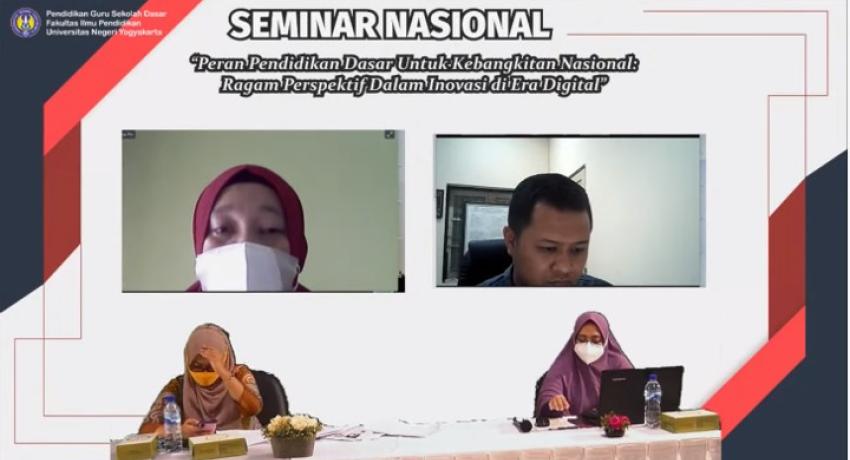Elementary-School Teacher Education Study Program and Primary Education Study Program of Faculty of Education UNY organized an Online National Seminar with the theme The Role of Primary Education for National Awakening: Various Perspectives in Digital Era Innovation, Wednesday, 2 June 2021, held offline and online using Zoom Meeting and Live Youtube FIP UNY Official Channel. There are three speakers, namely Dr. Idam Ragil Widianto Atmojo, S.Pd., M.Sc. (Universitas Sebelas Maret University), Dr. Zubaidah Amir MZ, M.Pd. (UIN Suska Riau), and Dr. Aprilia Tina Lidyasari, M.Pd. (Universitas Negeri Yogyakarta). This national seminar was moderated by Woro Sri Hastuti, M.Pd., Lecturer of Elementary-School Teacher Education UNY. The participants who attended were 1,080 people, consisting of teachers throughout Indonesia, undergraduate and postgraduate students, and lecturers of Faculty of Education UNY.
Dr Idam explained that there were several impacts of the industrial revolution 4.0 related to the world of education. "To deal with these technological developments, there are skills that must be possessed in 21st century learning, including 7 Cs (Critical Thinking and Doing, Creativity, Collaboration, Cross-cultural Understanding, Communication, Computing, Career & Learning Self Reliance), 3 Rs (Risk Taking, Reflectiveness, Resilience), 3 Ms (Made for Everyone, Meaningful, Motivation). Regarding innovation in learning technology, the first thing to do is to implement an innovative learning model in the Learning Management System (LMS), second, to modify the learning model in line with developments," said Idam.
Dr. Zubaidah Amir MZ, M.Pd, from UIN Suska Riau explained that teachers as educators today, in the era of digital technology, must have the ability to understand the characteristics of students in the digital era. Professional teachers based on RI Law No. 14 of 2005 concerning teachers and lecturers, there are 4 competencies that lead to increasing the ability to use technology. "The use of digital era technology in the learning process is carried out for several reasons, firstly the demands of the changing era of the digital era and the pandemic era that requires Distance Education (PJJ), secondly the challenges as a professional teacher, having insight, interest, care, sensitivity, liking, and ability and skills in using digital technology in learning, the three needs and characteristics of generation Z students who like challenges, are open to change, innovation and creativity, the four demands of life skills and 4C (critical, creative, collaborative, communicative)”, Zubaidah explained.
According to Dr. Aprilia Tina Lidyasari, M.Pd, innovation in the digital era can provide various conveniences as well as provide various challenges for children and parents. “For children, the media used by teachers in the learning process in this digital era is able to clarify the description of the material presented by the teacher, as well as facilitate students' needs for learning that is challenging, active, creative, effective and fun. Learning resources are widely open, can be accessed more quickly, more effectively and efficiently, integrated learning systems, knowledge, character, digital along with 21st century learning. This is in accordance with the principles of learning in elementary schools," she explained.
Even so, there are some challenges that must be faced by children and parents. For children, IT-based materials sometimes pay less attention to learning objectives, are made only for practical purposes and sometimes make children easily get bored. Guidance from the teacher is still very much needed. As for parents, children's learning mentoring activities during teaching and learning activities will provide an overview of the challenges of teachers in educating children in daily basis. Some parents with limited economic conditions, remote living locations, and inadequate educational backgrounds will certainly be more vulnerable in supporting the success of their children's learning process.
Chairman of the Committee, Dr. Yoppy Wahyu Purnomo, M.Pd. explained that this theme was taken because of the moment of national awakening, this is relevant to current conditions, related to the Covid-19 pandemic. "We look at the perspective of tools/tools, the perspective of children and parents, the perspective of teachers, how solutions and innovations are in the digital era. Therefore, we invited 3 speakers to provide perspectives to the participants of this seminar”, he explained.
Dean of Faculty of Education UNY, Dr. Sujarwo, M.Pd. thanked the three speakers, for their willingness to share their perspectives for this seminar, to all committees and seminar participants Sujarwo reminded that a few days ago when the Governor of Yogyakarta was a speaker in his Scientific Speech Commemoration Ceremony of the 57th Anniversary of Universitas Negeri Yogyakarta. The Governor in his speech conveyed the concept Renaissance, that our education should be built from keprajan, from the campus, and from the village.
“It is essential that education in Jogja should have a uniqueness that should not be left behind. Basic education is a level of education that has potential and is very strategic in inheriting, in maintaining high democratic values, despite of the massive influence of technology. It is important to persist that educational values are not only supported by technology, but also ensuring that technology that we use should be based on democratic values that are developed in humanistic way," said Sujarwo on his opening remarks for the seminar.





